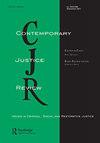Editorial for issue 24_02
Q2 Social Sciences
引用次数: 0
Abstract
Contemporary Justice Review exists to provide an interdisciplinary, peer-reviewed journal for scholars, activists, and practitioners of social and restorative justice around the globe who seek to share their theoretical, research-based, and applied work on the design and implementation of models of justice that take into account the needs of all. The journal’s articles have undoubtedly contributed to global discourse on the usefulness of restorative justice in disrupting trajectories into the criminal legal system and prison industrial complex, confronting racial, class, and immigration injustice, combatting gender-based violence and discrimination in all its forms, and transforming practices, policies and ideologies for a just world. In alignment with our interdisciplinary and global aims, the articles in this issue represent diverse perspectives and approaches to social, restorative and transformative justice from around the world. The timely and thought-provoking empirical research by Bello and Matshaba (South Africa) on university student perceptions of policing and their obedience and willingness to cooperate supports arguments that favor the adoption of just procedures that treat people fairly and with dignity and respect in place of reactionary policing. Similarly, Gawley, Cuellar, and Coyle (United States) explore the relationship between authoritarianism in schools and student behavior and suggest that preventive evidence-based therapeutic interventions, when used as viable alternatives to reactionary procedures, can result in enhanced school safety and promote positive student development. Asadullah and Morrison (Canada) draw attention to the roots and evolution of the restorative justice movement to refocus our lens on practices and initiatives that are community born, based, and led. Jokinen (Finland) addresses the moral conflict that divides critical feminist theory and restorative justice advocacy in cases of domestic violence. Bolaji’s (Ghana) phenomenological account of deep-rooted socio-political conflict in Dagbon provides a context for exploring the principle factors that position restorative justice as a central part of securing forgiveness, reconciliation and development in the region. Salm, Da Silva Neto, and Pamplona take us on a journey deep within the Brazilian Amazon to witness the rebirthing of culture, ecology, and the collective, which together create the conditions that inspire the use of restorative philosophy to resolve conflict. While weaving praxis and theory with eloquent prose, these authors reach out holding hands deeply soiled with fertile visions of a sustainable planet and join the call for us to live restoratively. May we echo the call. I ask you to join us by sharing your work and encouraging others across the globe to submit their manuscripts and book and film reviews to the Contemporary Justice Review. Please also see and share the call for papers on our upcoming Special Issue on Nonviolence. We want to hear from you. CONTEMPORARY JUSTICE REVIEW 2021, VOL. 24, NO. 2, 153–154 https://doi.org/10.1080/10282580.2021.1930972第24_02期社论
《当代司法评论》旨在为全球社会司法和恢复性司法的学者、活动家和实践者提供一本跨学科、同行评议的期刊,分享他们在设计和实施考虑到所有人需求的司法模式方面的理论、研究和应用工作。该杂志的文章无疑对恢复性司法在扰乱刑事法律体系和监狱工业综合体的轨迹,对抗种族、阶级和移民不公正,打击基于性别的暴力和一切形式的歧视,以及改变实践、政策和意识形态以实现公正世界方面的有用性作出了贡献。为了与我们的跨学科和全球目标保持一致,本期的文章代表了来自世界各地的社会,恢复性和变革性正义的不同观点和方法。Bello和Matshaba(南非)对大学生对警察的看法以及他们的服从和合作意愿进行了及时而发人深省的实证研究,支持了赞成采用公正程序的论点,以公平、尊严和尊重的方式对待人们,以取代反动的警察。同样,Gawley、Cuellar和Coyle(美国)探讨了学校专制主义与学生行为之间的关系,并提出预防性循证治疗干预措施,当作为替代反动程序的可行方案时,可以增强学校安全,促进学生的积极发展。阿萨杜拉和莫里森(加拿大)提请人们注意恢复性司法运动的根源和演变,以便将我们的镜头重新聚焦于社区诞生、基于和领导的实践和倡议。Jokinen(芬兰)探讨了在家庭暴力案件中区分批判女权主义理论和恢复性司法倡导的道德冲突。博拉吉(加纳)对达邦根深蒂固的社会政治冲突的现象学描述,为探索将恢复性司法定位为确保该地区宽恕、和解与发展的核心部分的主要因素提供了一个背景。Salm、Da Silva Neto和Pamplona带我们踏上巴西亚马逊深处的旅程,见证文化、生态和集体的重生,它们共同创造了激发使用恢复性哲学来解决冲突的条件。在用雄辩的散文编织实践和理论的同时,这些作者伸出双手,双手深深沾满了可持续发展星球的肥沃愿景,并加入了我们恢复生活的呼吁。让我们响应这个号召吧。我请你们和我们一起分享你们的工作,并鼓励世界各地的其他人向《当代司法评论》提交他们的手稿、书籍和电影评论。也请看到并分享我们即将到来的非暴力特刊的论文征集。我们想听听你的意见。《当代司法评论》2021年第24卷第2期。2,153 - 154 https://doi.org/10.1080/10282580.2021.1930972
本文章由计算机程序翻译,如有差异,请以英文原文为准。
求助全文
约1分钟内获得全文
求助全文

 求助内容:
求助内容: 应助结果提醒方式:
应助结果提醒方式:


